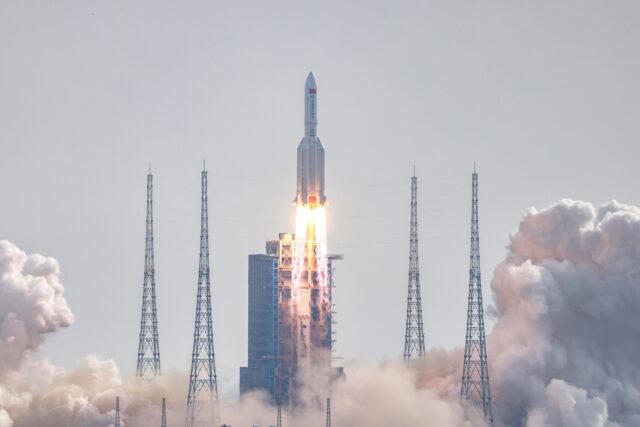Spain and France were forced to shut down flights at several airports as an out of control 24 tonne Chinese rocket hurtled back towards Earth.
Airports in Barcelona, Ibiza, Reus, Tarragona cancelled flights on Friday morning as the Long March 5B rocket, which launched the third piece of Communist China’s space station on Monday, was projected to crash land back on earth, El Pais reported. France was also forced to close airspace near Corsica from 9:30 to 10:30 a.m. local time as well.
The third and final piece of the station, Mengtian, or ‘Celestial Dream’, successfully joined the rest of the Tiangong, or ‘Celestial Palace’ space station after a docking procedure on Thursday afternoon, Chinese state-media the Global Times claimed.
According to United States Space Command the booster rocket made reentry into the atmosphere above the Pacific Ocean this morning. No injuries or damage have been reported at the time of this reporting. The U.S. agency said: “For details on the uncontrolled reentry’s impact location, we once again refer you to the [People’s Republic of China].”
Unlike other rockets, which are typically programmed to crash land in the Pacific Ocean, Chinese rockets are left uncontrolled as they crash back to earth. While the much of the rocket is expected to be disintegrated upon reentry, approximately 20 to 40 per cent of the 24 tonne booster rocket is expected to land somewhere on Earth.
Earlier this year, another Long March-5B rocket crash-landed over Malaysia, ultimately falling harmlessly in the Philippine Sea. In May of last year, a Long March rocket booster crashed on the Arabian Peninsula and the year before several buildings were damaged in the Ivory Coast as metal debris rained down upon villages in the West African nation from another Chinese rocket.
NASA administrator Bill Nelson previously criticised the communist country for its unsafe practices, saying in July: “All spacefaring nations should follow established best practices, and do their part to share this type of information in advance to allow reliable predictions of potential debris impact risk, especially for heavy-lift vehicles, like the Long March 5B, which carry a significant risk of loss of life and property.
“Doing so is critical to the responsible use of space and to ensure the safety of people here on Earth.”
The Aerospace Corporation, a California-based U.S. government-funded nonprofit research centre, said of the latest uncontrolled Chinese rocket: “Over 88 percent of the world’s population lives under the reentry’s potential debris footprint.
“Factors such as the rocket core’s uncontrolled manner of descent and its size, which is too large to entirely burn up in the Earth’s atmosphere, collectively present risks high enough that require additional precautionary preparation around the world.
Follow Kurt Zindulka on Twitter here @KurtZindulka

COMMENTS
Please let us know if you're having issues with commenting.